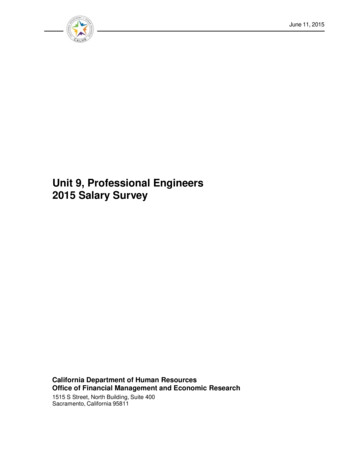
Transcription
Institution of Civil EngineersSalary Survey 2013 reportSalary Survey 2013UK Report
ContentsGlossary of terms . 3Introduction . 4Methodology . 6UK findings: highlights. 8UK respondents: sample characteristics . 10Section 1 UK income. 11Section 2 UK careers . 30Section 3 Recent economic climate . 41Section 4 UK recent graduates . 45Appendices . 512Salary Survey 2013 UK reportInstitution of Civil Engineers
Glossary of termsBasic incomePermanent salaried employmentGross basic rate salary before deducting tax and National Insurance (NI) in the UK or anequivalent state medical care contribution in other countries. Excludes bonuses and overtime.Self-employedIncome from all sources less direct expenses but before deducting tax, personal expensesand NI in the UK or an equivalent state medical care contribution in other countries.Contractors or part-time salaried employmentTotal earnings before deducting tax and NI in the UK or equivalent state medical carecontribution in other countries. Excludes additions from benefits contributions paid to theindividual.Secondary incomeIncome from other civil engineering related occupations if these were part of the mainoccupation in the year. The gross figure is given before deducting tax, examiner’s fees and NIin the UK or an equivalent state medical care contribution in other countries. Includesroyalties and part-time consultancy fees.OvertimeAll earnings for working extra hours. Excludes bonuses.BonusesAny share of profits, commission, fees, honoraria or other payments received from the sole orprincipal employer. Excludes overtime payments.Additional incomeThe sum of secondary income, overtime and bonuses.Mean and median incomeMean salaryThe sum of all salaries divided by theirnumber.Example {1,2,3,4,5}Mean value: (1 2 3 4 5)/5 3Median salaryThe central value of a range of salaries,or the mean of two central values iftheir number is even.Example {1,2,3,4,5,6}Median value: (3 4)/2 3.5Abbreviations used in the report3UKUnited KingdomCPIConsumer Price Index (official measure of inflation for UK)RPIRetail Price Index (measure of inflation)Salary Survey 2013 UK reportInstitutionCivil EngineersInstitutionof Civil ofEngineers
IntroductionI would like to thank all the ICE members who took part in ICE’s SalarySurvey 2013, our first in three years. The information provided hasbeen invaluable in bringing us up-to-date on salaries within civilengineering.The findings have been split into two reports – this version for the UK,and a separate report with results for Australia, Hong Kong, NewZealand and the United Arab Emirates.Some signs of recoveryThe civil engineering community was badly affected by the economic downturn, but there aresome signs of recovery emerging from this year’s results.Members feel more positive about the future. Views on job security have improved and therehas been a significant jump in the proportion of respondents seeing signs of economicimprovement in their organisations.Salary reviews are more common: 68% of respondents have had (or will have) a salaryreview in 2013, compared to only 35% in 2010.At the top of the profession, total income for Managing Directors, Chief Executive Officersand partners increased again this year after falling in 2010, and has now returned to 2008levels. The number of civil engineers earning 100k or more increased from 2.8% in 2010 to4.2% in 2013.Salaries for recent graduates are also recovering, following consecutive falls between 2008and 2010. Many recent graduates were employed before or immediately after theygraduated, and this group of members is also now more satisfied.Civil engineers now earn on average just under 50,000 a year.Still a challenging time for UK membersWhile overall salaries have increased slightly since 2010, they are still down in real terms.Mean basic income for the total sample has increased 2.5% since 2010, while the ConsumerPrice Index (CPI) increased by 9.8% over the same period.Members are also less satisfied with their professional lives. Satisfaction with jobs,employers and salary packages is down this year.Compared to other membership grades, Technician Members are least satisfied with theirsalary package, which is unsurprising given that their mean basic income has nominallydropped 7% since 2007.Unfortunately, the gap between earnings of men and women continues. While there isalmost no difference in salaries for younger members (aged up to 29), overall femalerespondents earn significantly less than their male colleagues.4Salary Survey 2013 UK reportInstitutionCivil EngineersInstitutionof Civil ofEngineers
Benchmark your salaryICE members can see how their salary compares with other civil engineers by using ouronline salary calculator, available in the MyICE section of ICE’s website.If you have any questions about the report, please email survey@ice.org.uk. I hope you willfind our latest salary survey useful and informative.NG BaveystockDirector General5Salary Survey 2013 UK reportInstitutionCivil EngineersInstitutionof Civil ofEngineers
MethodologyWhy a web survey?Since over 90% of ICE members have registered their email address with ICE, an onlinesurvey was the most accurate and cost-effective approach to use.To correct any imbalance in the sample profile, results were weighted by member age andgrade for the UK findings. These variables were chosen as weighting factors since they aremost likely to predict earnings.Data confidentialityThe survey was conducted by an independent market research agency, which hosted theweb questionnaire and kept all replies strictly confidential following the Market ResearchSociety guidelines.ICE only has access to this report and the aggregated results in the form of charts andtables, rather than any individual responses.Response rateNearly 39,000 working members in five countries were contacted by email in September2013 and asked to complete an online questionnaire. The number of respondents andresponse rates for the UK and other countries were:CountryNumber of respondentsResponse rateAustralia and New Zealand279 (AU 205 and NZ 74)16%Hong Kong43111%United Arab Emirates11121%United Kingdom5,71918%Recent graduatesSections of the report show results for Graduate members, as well as a sub-group of ‘recentgraduates’. Recent graduates are Graduate members, aged up to 34, with up to five years’experience in civil engineering.Within the UK sample, 1,157 respondents were recent graduates.Please note the findings for the Graduate grade sample (referred to as ‘All Graduates’ in thisreport) include the recent graduate sub-sample.Salary questionsTo ensure that the income data was as accurate as possible, precise definitions were givenin the survey. Respondents were asked to provide details of their basic income, secondaryincome, overtime pay and bonuses paid in the most recent tax period.6Salary Survey 2013 UK reportInstitutionCivil EngineersInstitutionof Civil ofEngineers
Main statistics used in the reportCharts in the report show the mean (commonly known as average) and median income.Mean is a more familiar term to most people; however, median is a better indicator of thetypical salary for a given respondent group as it is less affected by outliers (very low or highvalues).Period of researchThe same core questionnaire and online methodology have been used for the ICE SalarySurvey since 2004, so meaningful comparisons can be made with previous salary findings.The table below shows the report titles and corresponding tax years.7Tax yearSurvey name2012/2013Salary Survey 20132009/2010Salary Survey 20102008/2009Salary Survey 20092007/2008Salary Survey 20082006/2007Salary Survey 20072005/2006Salary Survey 20062003/2004Salary Survey 2004Salary Survey 2013 UK reportInstitutionCivil EngineersInstitutionof Civil ofEngineers
UK findings: highlightsIncome of UK members (section 1) Average salary for civil engineers nearly 50k – mean basic income for the totalsample in 2013 is 49,793 Basic income rises, slowly – mean basic income increased by 2.5% between 2010and 2013, while median basic income improved by 5.4%; slow increases consideringthe three-year gap between surveys Basic income decrease in real terms – taking inflation into account, mean basicincome is down since 2010 by 6.7% accounting for the Retail Price Index (RPI) or5.1% using the Consumer Price Index (CPI) Value of being Chartered – Chartered Engineers (CEng MICE) earn 30% more(mean basic income) than Incorporated Engineers (IEng MICE) and the difference inmedian basic income is 25% Women continue to earn less – the difference in salaries between male and femalemembers is nearly non-existent for younger members (aged up to 29), but for thoseaged 45-49, men earn 38% more than women. Overall, women earn 40% less thanmen, in line with the 42% difference registered in 2010 TMICE, the only grade recording negative change – since 2007 mean basicincome for TMICE decreased by 7% Total income for MDs/CEOs/Partners is back up – mean income for this grouphas increased by 8.3% since 2010, returning to the 2008 level Increase in proportion that earn 100k – those with basic income of 100k ormore increased from 2.8% of respondents in 2010 to 4.2% in 2013See section 1 (pages 11 – 29) for more detailed results on the income of UK members.Job satisfaction and professional development (section 2) Satisfaction down overall – across the whole sample, satisfaction with their currentrole, employer and compensation package is down. Satisfaction with thecompensation package registered the biggest drop Professional qualification a priority – in 2013, professional qualification was addedto the questionnaire and immediately topped the list as a priority for future careerdevelopment. Nearly one in four respondents said they want to obtain a professionalqualification (95% of this group do not have one yet) Membership fees – the proportion of those whose professional fees are paid byemployers increased from 59% in 2010 to 69% in 2013 Skills development – the need to have greater technical depth has been indicatedby 43% of respondents, up from 39% in 2010, but the key area is still soft skills What do members want? – in a strong message to employers, members say aclear career path is the factor that would most improve their working livesSee section 2 (pages 30 – 40) for more detailed results on non-salary related aspects of UKmembers’ professional lives.8Salary Survey 2013 UK reportInstitutionCivil EngineersInstitutionof Civil ofEngineers
UK findings: highlights continuedMembers and the economic climate (section 3) Salary reviews more common – 68% of respondents said they have had or will have asalary review this year, a significant increase on the 2010 result (35%); male and femalemembers are equally likely to have their salary reviewed in 2013 Job security increases significantly – 65% of respondents feel secure or very secureabout their jobs, up from 40% in 2010. Young members are most secure in their jobs,public sector employees are least secure More signs of improvement – the proportion of members seeing signs of economicimprovement increased significantly from 20% in 2010 to 72% in 2013See section 3 (pages 41 – 44) for more detail on how members feel the current economicclimate affects their professional lives.Recent graduates (section 4) Recent graduate salaries recovering – recent graduates experienced an increase of2.3% in mean basic income, close to the average increase for all UK members and apositive change after falling in consecutive years between 2008 and 2010 Salaries increase at a quicker pace after graduation – the trend is becoming morepositive for graduates in recent years, with salaries going up more quickly in the firstcouple of years of work. Salaries for those graduating in 2009 were 7.7% higher after twoyears, while salaries for 2011 graduates were 17.5% higher after two years Recent graduates more satisfied – in 2010, only 37% of recent graduates were fairly orvery satisfied with their salary package, compared with 43% in 2009 and 49% in 2008. In2013 this proportion is again near the 2008 level, at 48% No gender gap in basic income for recent graduates – recent female graduatescommand the same basic income as their male colleagues (close to 27k). However, thetotal salary received by male recent graduates is 2.5% higher, indicating men receive ahigher share of additional income (bonuses, overtime pay and secondary income) Most find employment – 62% of recent graduates were employed before, orimmediately after they graduated; only 6% were looking for a job longer than a yearSee section 4 (pages 45 – 50) for more detailed responses from recent graduates (ICEGraduate members aged up to 34 with no more than five years of professional experience).9Salary Survey 2013 UK reportInstitutionCivil EngineersInstitutionof Civil ofEngineers
UK respondents: sample characteristics10Age bands25 or under25-2930-3435-3940-4445-4950-5455-5960-6566 or overTotalCount of entage3%12%11%11%11%11%11%14%11%4%100%Response rate16%16%17%17%18%18%18%18%20%15%18%Membership gradeFICEMICEAMICETMICEAll Graduate membersTotalCount of %2%35%100%Response rate17%18%19%17%17%18%UK regionEast MidlandsEast of EnglandLondonNorth EastNorth WestNorthern IrelandScotlandSouth East EnglandSouth WestWalesWest MidlandsYorkshire and HumberTotalCount of onse emaleMaleTotalCount of se rate20%17%18%Salary Survey 2013 UK reportInstitutionCivil EngineersInstitutionof Civil ofEngineers
Salary Survey 2013 ReportSection 1: UK income findingsSection 1UK incomeThis section presents findings on UK members‘ earnings basedon: AgeMembership gradeLevel of responsibilityRegionGenderIt is followed by other job related information such as annualleave entitlement and employment benefits.
Section 1: UK income findings1.1.Basic income change 047,41440,00045,16639,88044,25135,647Baisc income in 50,00039,19160,00048,588Basic income change ding122008Survey year200920102013MedianThe mean basic income increased by 2.5% between 2010 and 2013, whilemedian basic income improved by 5.4% in the same period. The average(mean) basic income for civil engineers in 2013 is 49,793. Salaries rise again, slowly – ICE member salaries grew again after a small fall of 0.3% in 2009.But growth is slow considering the three-year gap between this and the previous survey Most earn mid- or lower-level income – the mean salary is higher than the median. Althoughthe difference isn’t big, it indicates a large number of members with mid- or lower-level salaries Increase in proportion that earn 100k – those with basic income of 100k or more increasedfrom 2.8% of respondents in 2010 to 4.2% in 2013. This high-earning group now commands12.5% of the earnings of the whole sample, up from 9.2% in 2010Salary Survey 2013 UK reportInstitution of Civil Engineers
1.2.Basic income change, RPI* and CPI*Basic income and RPI and CPI change 07MeanKeyfinding 2008Median2009RPI20102013CPIRPI and CPI increased more than mean and median basic salaries since2010, meaning civil engineers have less purchasing power now.Salaries grow slowly while inflation quite high – the economic crisis between 2007 and 2010and the resulting recession had a negative impact on salaries. At the same time, inflationremained relatively high and eroded salaries further in real termsMean basic income decrease in real terms – while salaries increased 2.5% between 2010 and2013, in real terms the mean basic income has gone down by 6.7% (if we account for RPI) or5.1% (if we account for CPI). This translates into a loss of between 4,450 and 3,668 inpurchasing power between 2010 and 33.7CPI100.0104.5107.0111.1113.1116.8128.3RPI (Retail Price Index) and CPI (Consumer Price Index) are measures of inflation. More details areavailable on the Office for National Statistics website (www.ons.gov.uk)13Salary Survey 2013 UK reportInstitution of Civil Engineers
9840,00028,68650,00024,808Basic income in 60,00050,47670,00051,500Basic income by age58,166Basic and total income by age57,0001.3.20,00010,0000 2525-2930-3435-3940-44MeanKeyfinding1445-49 50-54Age bands55-5960-65 65TotalMedianIt now takes longer for members to reach their full earning potential. In2010 those aged 50-54 earned the highest mean basic income. In 2013 thepeak is for members aged 55-59. Biggest rise for members aged 55-59 – salaries increased 9.6% for this group, closely followedby a 9.2% increase for the 45-49 age bracket (however salaries for these two groups fell in 2010) Income falls for members aged 50-54 – the only age band to register a drop in mean basicincome, down 2% from 2010. However, this could be a small adjustment following the 2010results, when salaries increased at an above average rate for 50-54 year-olds, but dropped formembers aged 45-49 and 55-59 Above average increase for more age bands – only three age bands (35-39, 50-54 and over65) experienced an above average salary increase in 2010. In 2013 mean basic incomeincreased above the 2.5% average for seven age groups (under 25, 25-29, 30-34, 40-44, 45-49,55-59 and over 65) Small salary differences for members aged up to 44 – indicated by the similar figures formean and median basic income within each age group up to this point. For members over 45,differences increase as some members accelerate their earning capabilities compared to theirpeersSalary Survey 2013 UK reportInstitution of Civil Engineers
0030,70440,00025,00050,00026,263Total income in 60,00054,92770,00064,47780,00071,318Total income by age20,00010,0000 2525-2930-3435-3940-44MeanKeyfinding45-49 50-54Age bands55-5960-65 65TotalMedianBoth mean and median total income have increased by 2% since 2010, asmall rise compared to the 4% year-on-year rise recorded in 2010. Theincrease is also less than basic income growth, showing a slowdown in theincrease of additional income*. Earning peak moves from 50-54 age band in 2010 to 55-59 in 2013 – following the sametrend as for basic income Biggest increase for members aged 45-49 – mean total income has grown 9.4% since 2010for this group: those aged over 65 and 50-54 saw total salaries drop 1.8% and 0.7% respectively Additional income* accounts for 11% of total income – it increases with age and peaks formembers aged 60-65 (chart below shows the share of additional income by age)Share of mean additional income*in total income30%20%10%0% 2525-2930-3435-3940-4445-4950-54Age band201355-5960-65 65Total2010** Additional income is the sum of secondary income, overtime pay and bonuses paid15Salary Survey 2013 UK reportInstitution of Civil Engineers
,00032,17750,00042,00060,00046,58855,880Basic income in 70,00050,00080,000Basic income by membership grade74,20090,00081,4471.4. Basic and total income by membership grade – UK20,00010,0000FICEMICEAMICETMICEAll GraduatesRecentGraduatesTotalMembership GradeMeanKeyfindingMedianRecent graduates* experienced a near-average increase of 2.3% in meanbasic income, a positive change after falling in consecutive years between2008 and 2010. Above average increases for three grades – between 2010 and 2013 mean basic incomegrew for AMICE, All Graduates and MICE (8.3%, 6.8% and 4.3% respectively) Double digit mean income growth between 2007-2013 for four grades – salaries for FICE,MICE, AMICE and All Graduates have grown between 10% to 14% in the last six years Slower growth for recent graduates since 2007 – while salaries increased at a near-averagerate for recent graduates between 2010 and 2013, since 2007 their mean basic income hasincreased at a moderate rate of 5% TMICE, the only grade recording negative change in the long-term – the survey indicatesthat TMICE salaries have dropped 17% since 2010. However, this figure should be treated withsome caution as the sample sizes for TMICE are smaller than other grades which means there isgreater volatility in year-on-year results. The overall trend since 2007 gives a more reliableindication, over which time TMICE mean basic income decreased by 7%*See definition of recent graduates on page 616Salary Survey 2013 UK reportInstitution of Civil Engineers
TMICE and recent graduate income varies least – similar mean and median basic incomeshows that basic income varies least within these membership grades. Income variation isdenoted by the standard deviation (distance of the data points from the mean) within eachmembership group, presented in the table below:MembergradeFICEMICEAMICEStandarddeviationin Totalsample7,68919,9655,22829,639Note: a low standard deviation indicates that individual salary values are very close to the mean value, ahigher standard deviation means the values are spread out over a larger range. Taking TMICE as anexample: salaries for 68% of TMICE are within 1 standard deviation of the mean ( 32,177 /- 7,689);salaries for 95% of TMICE are within 2 standard deviations ( 32,177 /- 15,378) and salaries for 99% ofTMICE are within 3 standard deviations ( 32,177 /- 23,067).17Salary Survey 2013 UK reportInstitution of Civil Engineers
29Basic income in 90,00052,000100,00082,000110,00096,908Total income by membership hip gradeMeanKeyfindingTMICERecentGraduatesMedianMean total income for recent graduates (graduate members with up to fiveyears of professional experience) stands at 28,649, 4.3% up on the 2010result and a change to a negative trend that started in 2009. Biggest changes for AMICE and TMICE – between 2010 and 2013 mean total incomeincreased 10.7% for AMICE but decreased 13.1% for TMICE. However, smaller sample sizes forthese grades make year-on-year results more volatile Total income rises for MICE – their average total salary improved 3.6% from 60k in 2010 FICE total income falls back to 2009 level – Fellows average earnings have fallen 2.5% since2010, not far from the level registered in 2009 ( 94k) Bonus makes up highest share of additional income* – at 59% overall. For AMICE, thisproportion reaches 66%, followed by FICE and MICE at 63% 14% of all members declare secondary income – the highest mean value was generated byFICE ( 17,721), followed by MICE ( 15,306) and AMICE ( 14,750) Average bonus is 6.2% of basic income – the relation of bonus vs. basic income by grade ispresented in the table below:MembergradeFICEMICEAMICETMICE% bonusvs. Totalsample3.7%2.2%6.2%* Additional income is the sum of secondary income, overtime pay and bonuses paid18TotalSalary Survey 2013 UK reportInstitution of Civil Engineers
1.4.1Basic salary by professional qualificationBasic income by professional 0,00040,00050,00050,00044,437Basic income in chMICE CEngMICE IEngProfessional qualificationMeanKeyfinding19MedianChartered Engineers (CEng MICE) command higher salaries than holdersof other professional qualifications. Within MICE, CEng MICE earn 30%more (mean basic income) than Incorporated Engineers (IEng MICE). Thedifference in median basic income is 25%. CEng MICE basic income higher than MICE overall – when comparing within the MICE grade,those with CEng qualification earned a mean basic income of 56,452 while MICE overallrecorded 55,880 EngTech TMICE mean basic income also higher – as observed for MICE, the same is true forTMICE. Those who are EngTech registered had a mean basic income of 32,398, while allTMICE earned 32,177 in the last fiscal yearSalary Survey 2013 UK reportInstitution of Civil Engineers
1.5Basic and total income by level of ,00050,00036,15460,00041,00070,00025,722Basi income in 80,00060,00090,00048,998100,00080,00091,169Basic income by main level of responsibility20,00010,0000Main level of responsibilityMeanKeyfindingMedianMean basic income for MDs/CEOs/partners is now 91,169, up 8.9% from 83,697 in 2010. This is a big improvement on the 0.4% increaseregistered in 2010. Premium increases for those at top of profession – the mean basic income premium ofmembers in the Managing Directors/CEOs/Partners category over the total sample increasedfrom 72% in 2010 to 83% in 2013 (same for median), which sees a return to the 2008 level Mean basic income rise of 2.8% for managers/directors – income for those in the next mostsenior category increased 2.8% from 2010, to 65,630 Largest 2004-2013 basic income increase for project managers – while members ineducation/R&D saw the highest basic salary increase between 2010 and 2013 (nearly 10%)*,those in project management registered the biggest positive salary change between 2004 and2013 (39%)* This response option for the level of responsibility question was slightly changed between 2010 and 2013 which may have influenced theincrease level. 2010 phrasing: academia/teaching, 2013 phrasing: education, teaching or research and development20Salary Survey 2013 UK reportInstitution of Civil Engineers
117,112Total income by main level of 00027,293Total income in 00Level of responsibilityMeanKeyfinding21MedianMean total income of those just starting their civil engineering career (onthe-job training) has improved by 3.6% since 2010. However, mean basicincome for this group is just 0.5% higher than in 2006. Total income for MDs/CEOs/Partners back up – the mean compensation package for thisgroup has increased 8.3% since 2010, returning to the 2008 level before the economic downturntook hold MDs/CEOs/Partners are best earners – they represent 3.5% of the total respondent sample,but account for 8.3% of the total income for all respondents 2.5% increase for managers/directors – accounting for 16.5% of the sample, this groupexperienced a 2.5% rise in mean total income, up from 72,806 in 2010 Overtime income most common early in career – those in on-the-job training received themost (paid) overtime, as a proportion of additional incomeSalary Survey 2013 UK reportInstitution of Civil Engineers
1.6Basic and total income by 50,00043,000Basic income in 60,00059,02770,00048,000Basic income by ianMean basic income has increased the most (9.7%) since 2010 formembers in the North East, but salaries in the region are still 10% belowthe average for all regions. London-based members still earn the most – although there was a small drop of 1% formembers in London, the mean basic income in this region continues to be highest, followed bySouth East England (9.4% less than London) and the East Midlands (18.4% lower) South East England catching up with London – in 2010 London and South East Englandexperienced a below-average increase in mean basic salary on the 2009 survey. In 2013 SouthEast England income increased in line with the total sample, while London salaries dropped 1% Salaries fall for two regions – mean basic salaries for the South West and the East of Englandincreased between 2007-2010, but since 2010 salaries have dropped 5.9% and 8.1%respectively Slowest growth in Yorkshire and Humber – mean basic salary increased least between 2004and 2013 for Yorkshire and Humber (15.5%); while it increased most for the East Midlands(36.9%), North West (34.9%) and Wales (33.9%). The overall mean basic income increase inthat period was 27.1%Salary Survey 2013 UK reportInstitution of Civil Engineers
5240,00049,69151,67645,03850,00045,000Tot
The same core questionnaire and online methodology have been used for the ICE Salary Survey since 2004, so meaningful comparisons can be made with previous salary findings. The table below shows the report titles and corresponding tax years. Tax year Survey name 2012/2013 Salary Survey 2013 2009/2010 Salary Survey 2010










